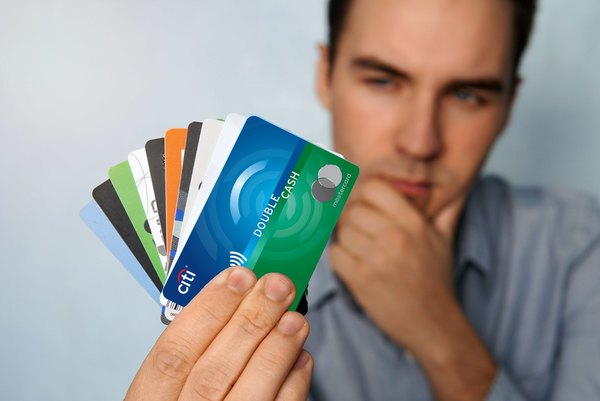Getting out of debt isn’t easy, but it is possible when implementing the right strategies.
Debt can leave you feeling overwhelmed. It can negatively affect your credit score, which can lead to even more issues, like difficulty obtaining a loan, renting an apartment, or even getting hired for a job.
Whether you carry a balance on your cards month after month or owe a significant amount of money that seems to keep growing larger, you can make changes to prevent debt from ruining your life.
Create a monthly budget
One of the first things to do when you’re ready to tackle credit card debt is to make a budget. Without a budget, you likely don’t even have a clear idea of what you’re spending your money on each month. When using credit cards, it can be all too easy to spend on unnecessary items without giving it a second thought, making your situation even worse. Create a monthly budget by writing down all of your expenses and listing out how much money you need for each one, including your credit card payments. Seeing where your money goes helps you understand the changes that you need to make.
Make spending cuts
Look for areas of opportunity in your budget where you can scale back or reduce spending. You may be surprised at where you can reduce your monthly expenses. These can be simple things like dining out less and cooking more meals at home. Depending on your situation, you could take more serious steps to reduce your expenses, like downsizing to a smaller home or getting a roommate to share the rent. While many cuts may not be ideal, know that they can be temporary while you pay off your credit cards.
Switch to cash
Once you’re in credit card debt and you begin to feel pressure to pay it off, it’s time to stop using your cards. Take them out of your wallet and put them away in a safe place. When you shop with cards it can be all too easy to spend because you don’t feel the pain of parting with your money. Switch to an all-cash budget so that you can control how much you spend and see exactly where your hard-earned money is going.
Make extra income
To get out of credit card debt quicker, you need to put as much money as you can towards the balance. Since you likely only make a set amount of income from your job, you need to find ways to bring in extra income. Brainstorm ideas for ways that you can make more money to put towards your credit card payments. Pick up a part-time job, start a side hustle from home, or put your creative talents to use by making something to sell. Any extra money that you earn can be used to pay off those cards faster.
Focus on one card at a time
If you carry debt on multiple credit cards, focus on paying off the card with the lowest balance first. Keep making the minimum payments on all of the cards but put any extra money that you can towards the payment on that lowest balance card. Once you have paid that card off, start putting the money towards the next one. By paying off the lowest balance, you’ll have a sense of accomplishment and will get a boost to help you work on the remaining credit card debt.
Build an emergency fund
Even though you need to put extra money towards paying off debt, it’s important to have an emergency fund, too. Create a budget category for emergency savings so that you can start to build it up. Having an emergency fund of cash available will allow you to use that money to pay for any unexpected expenses that may come up, like car repairs or medical bills. With savings in the bank, you won’t have to run to credit cards.
When credit card debt becomes unmanageable
Sometimes debt simply becomes too much for you to handle on your own. If you owe a significant amount of money and paying it off just isn’t realistic, consider a more aggressive option to tackle it. These measures do have drawbacks, but depending on your situation, they may be a good option for dealing with debt:
Debt consolidation
Debt consolidation is a way to combine all of your credit card debt in one place and make a single monthly payment towards it, rather than paying multiple cards each month. You can do this by transferring your credit card balances to one card with a lower interest rate, or with a debt consolidation loan.
Consolidating credit card debt is a good option if you always make your monthly payments on time and qualify for a 0% or low-interest card. It’s important not to add more debt once you consolidate, so it may be necessary to change your spending habits. If you’re serious about getting rid of the debt and taking control of your finances, it’s a reasonable choice.
Using a personal loan allows you to pay off your credit card debt in full, and then make monthly payments towards the loan instead. The advantage is that you won’t be paying that credit card interest over time and you’ll have a set timeframe for paying back the loan. However, you do need to meet the eligibility standards for the loan provider.
Bankruptcy
The most extreme option for credit card debt relief is bankruptcy. Choosing to file for bankruptcy is not a decision to be made lightly, but in some cases, it can be the answer. If you’ve fallen behind on payments and your interest rate has gone up, your debt may become insurmountable. Debt collectors can begin harassing you, calling you at home and at your place of employment, and even reaching out to your family. This only adds to the stress. With bankruptcy, credit card debt is eliminated and the calls from debt collectors will stop. However, this option doesn’t come without drawbacks.
The downside to bankruptcy for getting out of debt is that it stays on your credit report for years to come and will bring your credit score down significantly. This has an impact on other areas of your life, in many cases making it more difficult to get a new job, approval for a mortgage, and purchase a car with a loan, just to name a few. Additionally, you may feel ashamed for having gotten yourself into this situation in the first place. Filing for Chapter 7 bankruptcy should be considered as a last resort for fixing your finances.
Dealing with debt can be scary. It can leave you feeling overwhelmed and in the worst cases, completely hopeless. However, there are actions that you can take to improve your financial situation. You don’t have to let the money that you owe determine your future and ruin your life. Getting out of debt isn’t easy, but it is possible when you put the right strategies into action.






